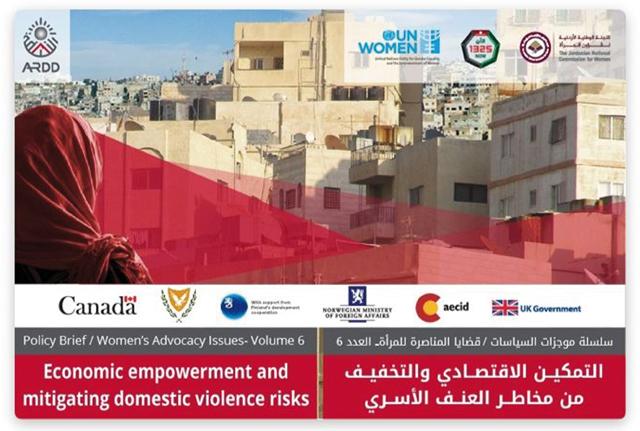You are here
ARDD policy brief calls for economic empowerment of domestic violence survivors
By Mays Ibrahim Mustafa - Apr 26,2022 - Last updated at Apr 26,2022

AMMAN — The Arab Renaissance for Democracy and Development (ARDD) released a recent policy brief highlighting economic empowerment as “key” to supporting gender-based domestic violence survivors.
The report’s findings show that 87 per cent of the participants view domestic violence as a “prominent issue in Jordan”.
Tradition and low family economic status were identified as “key” factors contributing to domestic violence by two-thirds of the participants in the study.
The brief noted that “domestic violence has worsened in Jordan during the COVID-19 pandemic, with organisations specialised in providing services to survivors of gender-based violence reporting an increase in its prevalence”.
Moreover, lockdowns and restrictive measures imposed by the government limited survivors’ access to needed services, it added.
Therefore, the research attempts “to understand the local communities’ views on gender-based violence” in order to identify how to best address and respond to it, as per the brief.
It was found that, “64 per cent of the participants in the study [believe] that domestic violence always manifests physically.”
The report noted that this perception demonstrates a lack of awareness concerning another intangible form of domestic violence, mental harm.
It added that this “lack of knowledge” might lead those undergoing mental abuse “to be unaware or in denial”, often justifying it as a lesser form of violence.
The study also identified local communities’ viewpoints on the needs of domestic violence survivors and the means to address them, which would focus on “rehabilitation and empowerment”.
The report shows that roughly half of the participants endorsed asking for the provision of shelters as one of the services needed to empower survivors of domestic violence, while smaller segments of participants endorsed the provision of social support, educational opportunities, legal aid and consultation and personal security protection.
Eighty per cent of participants stood in favour of economic empowerment through “the provision of job opportunities” and 37 per cent recommended “cash aid”, the report said.
These two services, according to the report’s findings, were hailed as “necessary” in the rehabilitation of survivors and might also “be a way of addressing the unequal power structure within families, which limits women’s decision-making process”.
However, the research showed that “employment does not [always] mean empowerment and husbands might still be in control of their wives’ income”.
In response to a scenario in which a husband might forcibly attempt to take his wife’s salary, 75.71 per cent of surveyed women said they would refuse the husband’s request, while 26 per cent would give up their salaries for their husbands and 18 per cent would resort to the Family Protection Department (FPD).
According to the report’s recommendations, respondents noted that understanding survivors’ needs better and providing training for the staff of the FPD and other organisations assisting survivors of domestic violence is important. The local perspective also highlighted the importance of psychological support provided by professionals.
Moreover, participants believed that “fear and the stigma of divorce limit survivors’ options,” the report said, noting that raising awareness of domestic violence, its impact, and its different types and causes is “necessary”.
Related Articles
AMMAN — Local organisations and UN agencies in Jordan gathered online last week to discuss the best practical means to support gender-based
AMMAN — The civil society and UN agencies on Tuesday welcomed a recent pledge by the police chief and the government to exert all possible m
AMMAN — A report issued by the Arab Renaissance Organisation for Democracy and Development (ARDD) showed that 65 per cent of Jordanian women

















